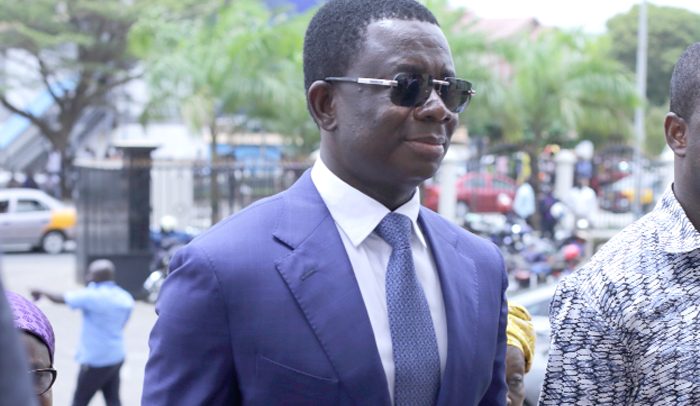Dr Stephen Kwabena Opuni
The judge presiding over the criminal trial of Dr Stephen Kwabena Opuni, a former Chief Executive of the Ghana Cocoa Board (COCOBOD) and Seidu Agongo, the CEO of Agricult Ghana Limited, today rejected an application by the lawyer for Dr Opuni, Samuel Cudjoe, for a stay of proceedings.
The court said Mr Cudjoe could not even manage to provide a single good reason for which the application should be granted.
It added that granting the application would only result in an unnecessary “delay and will stultify the case”.
Mr Cudjoe applied for the stay of proceedings at the High Court hearing the substantive case against Dr Opuni and Mr Agongo after applying for an interlocutory injunction at the Court of Appeal but of which the Court of Appeal is yet to make a determination.
The issue which has caused the lawyer for the accused to make these applications is a ruling by the High Court on 10th July 2019 in which the judge rejected an attempt by Mr Cudjoe to tender into evidence a letter dated 20th November 2014.
The later told the court that day, that the letter was written and sent from COCOBOD to Agricult Ghana Limited and that in the letter, Lithovit was referred to as liquid fertilizer but the court found that, he failed to lay sufficient foundation, an important procedural benchmark for tendering documents into evidence, as such, his tender was rejected.
Today, the court determined that another failure on the part of Mr Cudjoe to meet yet another important procedural benchmark, this time with respect to applying for a stay of proceeding, meant that his application could not be accepted.
It was instead rejected and dismissed.
By filing an application for stay of proceedings, Dr Opuni’s lawyer was asking the judge of the High Court presiding over the substantive case to put the trial on hold, until a ruling is made by the appellate court on the interlocutory injunction.
In his ruling today, Justice Clemence Honyenuga, the Appeal Court Judge, sitting as an additional High Court Judge and presiding over the trial referenced a Supreme Court ruling which held that the granting of an application for a stay of proceedings is solely at the discretion of the judge of the case and must be exercised judicially; not whimsically or capriciously.
He added that for an application for a stay of proceedings to be granted, the applicant, who in this instance is the lawyer for Dr Opuni, is required to prove the existence of special or exceptional circumstances, such as, the strong possibility of irreversible hardship to his client, if the case is not stayed, however, no such proof of any kind of special or exceptional circumstance for which the application should be granted was provided; not a single one.
The judge stated that upon perusal of the application and all relevant documents, it was his considered view that staying the trial will only further delay and stultify the case of which cross examination of the prosecution’s third witness alone has gone on for months with no end in sight.
“This court has been fair and has not prevented any of the accused from putting across their case. I do not see any irreversible hardship that will be occasioned by the refusal. I will dismiss the application.”
This is the second time this year that the accused has filed these applications, at the High Court hearing the substantive case and at the Court of Appeal.
The first happened in March. Similar to this instance, the accused mounted a challenge against the rejection of their attempt to tender into evidence a report written by a committee set up by the Cocoa Research Institute of Ghana (CRIG) to investigate a missing document.
They told the court at that time that the committee’s report was germane to their case.
The High Court rejected their application and they lost the interlocutory appeal at the Court of Appeal.
The prosecution is confident that the accused will suffer the same outcome a second time


